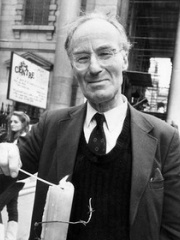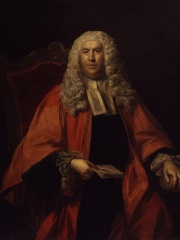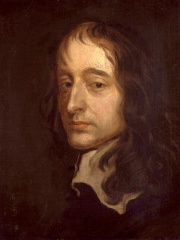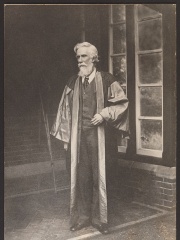






The Most Famous
LAWYERS from United Kingdom
This page contains a list of the greatest British Lawyers. The pantheon dataset contains 136 Lawyers, 8 of which were born in United Kingdom. This makes United Kingdom the birth place of the 3rd most number of Lawyers behind United States, and Germany.
Top 8
The following people are considered by Pantheon to be the most legendary British Lawyers of all time. This list of famous British Lawyers is sorted by HPI (Historical Popularity Index), a metric that aggregates information on a biography's online popularity.

1. Peter Benenson (1921 - 2005)
With an HPI of 67.07, Peter Benenson is the most famous British Lawyer. His biography has been translated into 39 different languages on wikipedia.
Peter Benenson (born Peter James Henry Solomon; 31 July 1921 – 25 February 2005) was a British barrister, human rights activist and the founder of the human rights group Amnesty International (AI); a global movement of more than 10 million people, currently, and in over 150 countries and territories who campaign to end abuses on human rights and to secure the release of political prisoners. He refused all honours for most of his life, but in his 80s, largely to please his family, he accepted the Pride of Britain Award for Lifetime Achievement in 2001. In the 1980s, he became the Chairman of Association of Christians Against Torture. Also, in the 1990s Peter Benenson organized aid for Romanian orphans. He also founded a group to aid victims of celiac disease which he had.

2. William Blackstone (1723 - 1780)
With an HPI of 61.19, William Blackstone is the 2nd most famous British Lawyer. His biography has been translated into 32 different languages.
Sir William Blackstone (10 July 1723 – 14 February 1780) was an English jurist, justice, and Tory politician most noted for his Commentaries on the Laws of England, which became the best-known description of the doctrines of the English common law. Born into a middle-class family in London, Blackstone was educated at Charterhouse School before matriculating at Pembroke College, Oxford, in 1738. After switching to and completing a Bachelor of Civil Law degree, he was made a fellow of All Souls College, Oxford, on 2 November 1743, admitted to Middle Temple, and called to the Bar there in 1746. Following a slow start to his career as a barrister, Blackstone was involved heavily in university administration, becoming accountant, treasurer, and bursar on 28 November 1746, and Senior Bursar in 1750. Blackstone is considered responsible for completing the Codrington Library and the Warton Building, and for simplifying the complex accounting system used by the college. On 3 July, 1753, he formally gave up his practice as a barrister, and embarked on a series of lectures on English law, the first of their kind. These talks were massively successful, earning him £453 (£94,000 in 2025 terms); they led to the publication of An Analysis of the Laws of England in 1756, which sold out repeatedly. It was used to preface his later works. On 20 October, 1759, Blackstone was confirmed as the first Vinerian Professor of English Law, immediately embarking on another series of lectures and publishing a similarly successful second treatise, A Discourse on the Study of the Law. With his growing fame, he successfully returned to the bar and maintained a good practice, also securing election as Tory Member of Parliament for the rotten borough of Hindon on 30 March 1761. In November 1765 he published the first of four volumes of Commentaries on the Laws of England, considered his magnum opus; the completed work earned Blackstone £14,000 (£2,459,000 in 2023 terms). After repeated failures, he gained appointment to the judiciary as a justice of the Court of King's Bench on 16 February 1770, leaving to replace Edward Clive as a justice of the Common Pleas on 25 June. He remained in this position until his death, on 14 February 1780. Blackstone's four-volume Commentaries were designed to provide a complete overview of English law and were republished in 1770, 1773, 1774, 1775, 1778, and in a posthumous edition in 1783. Reprints of the first edition, intended for practical use rather than antiquary interest, were published until the 1870s in England and Wales, and a working version by Henry John Stephen, first published in 1841, was reprinted until after the Second World War. Legal education in England had stalled; Blackstone's work gave the law "at least a veneer of scholarly respectability". William Searle Holdsworth, one of Blackstone's successors as Vinerian Professor, argued that "If the Commentaries had not been written when they were written, I think it very doubtful that the United States, and other English speaking countries would have so universally adopted the common law." In the United States, the Commentaries influenced Alexander Hamilton, John Marshall, James Wilson, John Jay, John Adams, James Kent and Abraham Lincoln, and remain frequently cited in Supreme Court decisions.

3. Henry de Bracton (1210 - 1268)
With an HPI of 59.38, Henry de Bracton is the 3rd most famous British Lawyer. His biography has been translated into 16 different languages.
Henry of Bracton (c. 1210 – c. 1268), also known as Henry de Bracton, Henricus Bracton, Henry Bratton, and Henry Bretton, was an English cleric and jurist. He is famous now for his writings on law, particularly De legibus et consuetudinibus Angliæ ("On the Laws and Customs of England"), and his ideas on mens rea (criminal intent). According to Bracton, it was only through the examination of a combination of action and intention that the commission of a criminal act could be established. He also wrote on kingship, arguing that a ruler should be called king only if he obtained and exercised power in a lawful manner. In his writings, Bracton manages to set out coherently the law of the royal courts through his use of categories drawn from Roman law, thus incorporating into English law several developments of medieval Roman law.

4. John Selden (1584 - 1654)
With an HPI of 56.91, John Selden is the 4th most famous British Lawyer. His biography has been translated into 19 different languages.
John Selden (16 December 1584 – 30 November 1654) was an English jurist, a scholar of England's ancient laws and constitution and scholar of Jewish law. He was known as a polymath; John Milton hailed Selden in 1644 as "the chief of learned men reputed in this land".

5. Karim Ahmad Khan (b. 1970)
With an HPI of 56.31, Karim Ahmad Khan is the 5th most famous British Lawyer. His biography has been translated into 21 different languages.
Karim Asad Ahmad Khan (born 30 March 1970) is a British lawyer who has served as Prosecutor of the International Criminal Court since 2021. He specialises in international criminal law and international human rights law. On 20 May 2024, Khan announced the ICC's decision to apply for arrest warrants for Israeli prime minister Benjamin Netanyahu, Israeli defence minister Yoav Gallant, and Hamas leaders Yahya Sinwar, Mohammed Deif, and Ismail Haniyeh for alleged war crimes and crimes against humanity. In November 2024, the ICC issued an arrest warrant for Netanyahu, along with Gallant and Deif. An arrest warrant against Myanmar military junta leader, Min Aung Hlaing, was also requested the same month. Khan temporarily stepped down as chief prosecutor in May 2025 due to allegations of sexual misconduct. In February 2025, the United States Department of the Treasury imposed sanctions on Khan after US president Donald Trump sanctioned ICC officials for issuing arrest warrants against Netanyahu and Gallant for alleged war crimes in Gaza.

6. George Hadley (1685 - 1768)
With an HPI of 54.18, George Hadley is the 6th most famous British Lawyer. His biography has been translated into 18 different languages.
George Hadley (12 February 1685 – 28 June 1768) was an English lawyer and amateur meteorologist who proposed the atmospheric mechanism by which the trade winds are sustained, which is now named in his honour as Hadley circulation. As a key factor in ensuring that European sailing vessels reached North American shores, understanding the trade winds was becoming a matter of great importance at the time. Hadley was intrigued by the fact that winds which should by all rights have blown straight north had a pronounced westerly flow, and it was this mystery he set out to solve.

7. A. V. Dicey (1835 - 1922)
With an HPI of 53.98, A. V. Dicey is the 7th most famous British Lawyer. His biography has been translated into 20 different languages.
Albert Venn Dicey, (4 February 1835 – 7 April 1922) was a British Whig jurist and constitutional theorist. He is most widely known as the author of Introduction to the Study of the Law of the Constitution (1885). The principles it expounds are considered part of the uncodified British constitution. He became Vinerian Professor of English Law at Oxford, one of the first Professors of Law at the LSE Law School, and a leading constitutional scholar of his day. Dicey popularised the phrase "rule of law", although its use goes back to the 17th century.

8. Philippe Sands (b. 1960)
With an HPI of 49.19, Philippe Sands is the 8th most famous British Lawyer. His biography has been translated into 17 different languages.
Philippe Joseph Sands (born 17 October 1960) is a British and French writer and lawyer at 11 King's Bench Walk and Professor of Laws and Director of the Centre on International Courts and Tribunals at the Faculty of Laws, University College London. A specialist in international law, he appears as counsel and advocate before many international courts and tribunals, including the International Court of Justice, the International Tribunal for the Law of the Sea, the European Court of Justice, the European Court of Human Rights and the International Criminal Court. Sands has served on the panel of arbitrators at the International Centre for the Settlement of Investment Disputes (ICSID) and the Court of Arbitration for Sport (CAS). He is the author of seventeen books on international law, including Lawless World (2005) and Torture Team (2008). His book East West Street: On the Origins of Genocide and Crimes against Humanity (2016) has been awarded numerous prizes, including the 2016 Baillie Gifford Prize for Non-Fiction, and has been translated into 24 languages. His latest books are The Ratline: Love, Lies and Justice on the Trail of a Nazi Fugitive (2020) about Otto Wächter, The Last Colony: A Tale of Exile, Justice and Britain's Colonial Legacy (2022) about Chagos and the life of Liseby Elysé and 38 Londres Street: On Pinochet in London and a Nazi in Patagonia (2025). Sands served as President of English PEN from February 2018 to April 2023 and was a member of the Board of the Hay Festival of Arts and Literature, from 2018 to December 2024.
People
Pantheon has 8 people classified as British lawyers born between 1210 and 1970. Of these 8, 2 (25.00%) of them are still alive today. The most famous living British lawyers include Karim Ahmad Khan, and Philippe Sands. The most famous deceased British lawyers include Peter Benenson, William Blackstone, and Henry de Bracton.
Living British Lawyers
Go to all RankingsDeceased British Lawyers
Go to all RankingsPeter Benenson
1921 - 2005
HPI: 67.07
William Blackstone
1723 - 1780
HPI: 61.19
Henry de Bracton
1210 - 1268
HPI: 59.38
John Selden
1584 - 1654
HPI: 56.91
George Hadley
1685 - 1768
HPI: 54.18
A. V. Dicey
1835 - 1922
HPI: 53.98
Overlapping Lives
Which Lawyers were alive at the same time? This visualization shows the lifespans of the 3 most globally memorable Lawyers since 1700.

